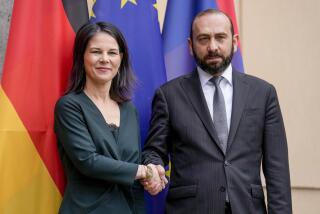Bonn, Moscow Report Progress on Key Issue : Reunification: The foreign ministers move closer to resolving differences over the status of a future Germany.
- Share via
BREST, Soviet Union — Against a backdrop heavy with history, West German and Soviet foreign ministers met for six hours in this border city Monday and declared that they have moved closer to resolving key differences on the status of a future united Germany.
Although Soviet Foreign Minister Eduard A. Shevardnadze and his West German counterpart, Hans-Dietrich Genscher, repeatedly declined to offer details of the talks, they indicated that progress had been achieved both on the question of a united Germany’s membership in the NATO alliance and the larger question of relations between the North Atlantic Treaty Organization and the Soviet-dominated Warsaw Pact.
“Progress is there,” Shevardnadze declared. “This is extremely difficult diplomatic work.”
Both Germanys and three of the four victorious World War II allies--the United States, Britain and France--want a united Germany that is a fully integrated member of NATO. The Soviet Union, under considerable domestic pressure, has consistently resisted such a proposal.
The city of Brest, on the Polish border, was the scene of heavy fighting between Nazi and Soviet forces in World War II, in which Shevardnadze’s brother was killed. It is also where the Germans and the Bolsheviks signed the Treaty of Brest-Litovsk in 1918 ending Moscow’s role in World War I.
The location for the talks was reportedly chosen by Shevardnadze.
While differences clearly remained in this--the third meeting in just over two weeks between the two foreign ministers--a conspicuously conciliatory atmosphere bred optimism among both Soviet and West German officials that still-divisive issues surrounding German unity can be resolved soon.
The two agreed to meet again next week, before the June 22 meeting in East Berlin of foreign ministers from both Germanys and the four victorious Allied powers.
Genscher said his Soviet counterpart indicated a strong willingness during Monday’s talks to reach agreement.
“I was surprised that he himself pointed to the necessity of getting through the negotiations,” Genscher told reporters aboard his return flight to Bonn. “He really wants that.”
West German officials noted that Shevardnadze had apparently dropped the idea of letting internal German unity proceed quickly while negotiations on external aspects of unity, such as alliance membership, move more slowly.
In some ways, the change of atmospherics was similar to that at the recent U.S.-Soviet summit in Washington, where two former adversaries seemed to be searching for a common way forward.
“This is a demonstration of our will to finally draw a line under the last war and begin a new chapter of our relations,” Shevardnadze told a news conference after the talks.
In a moving, personal gesture ostensibly aimed at underscoring this point, Shevardnadze and Genscher visited a Soviet war memorial and cemetery just west of the city where Shevardnadze’s brother and thousands of other Soviet soldiers are buried amid the ruins of a 19th-Century fortress.
Genscher laid wreaths at an eternal flame and at the headstone of 21-year-old Sgt. Akaki Shevardnadze, who died in heavy fighting during the first hours of the Nazi invasion of the Soviet Union in June, 1941.
Sgt. Shevardnadze is one of 830 Soviet soldiers buried adjacent to the flame along three black polished granite walls listing the names of the dead.
Those Soviets who defended the Brest fortress were among the first of about 27 million of their compatriots to die in World War II, by far the largest number of casualties suffered by any nation during the conflict.
The lingering trauma of that experience has loaded the German-Soviet relationship with excessive emotional and political baggage ever since.
After laying the wreath, Genscher and Shevardnadze together placed individual carnations atop some of the graves.
The location of Brest, since 1939 a Soviet border town on the Bug River, carries other dimensions in Soviet-German history. Brest-Litovsk, as Brest was known until 1940, was also where the Bolshevik Leon Trotsky negotiated a separate peace with Germany in March, 1918, ending Russian participation in World War I. The pact’s terms forced Russia to accept the independence of the Ukraine, Georgia and Finland and cede all or parts of Poland, the Baltic republics and Byelorussia to Germany and the Austro-Hungarian Empire.
More to Read
Sign up for Essential California
The most important California stories and recommendations in your inbox every morning.
You may occasionally receive promotional content from the Los Angeles Times.










